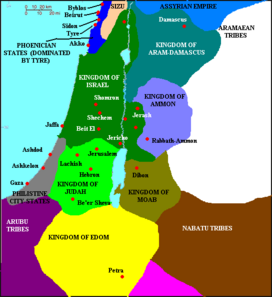Kingdom of Judah
The Kingdom of Judah, or Southern Kingdom came into existence after the days of King Solomon, with Jerusalem as its capital.
The Split
Initially, King Rehoboam, son of Solomon ruled the united Kingdom of Israel. Solomon, due to his extensive building projects which were not limited to the Temple of Solomon, had heavily taxed the nation. When Rehoboam came to power, he was given advice by two sets of advisors. The older set advized the new king to lower taxes and gain favor with the people. The younger set of advisors told Rehoboam to give them heavy taxes, and exert his authority over the kingdom.
Rehoboam listened to his younger set of advisors, and sent his tax collector to the northern territories to collect the taxes. The northern ten tribes, already upset by a tax system that favored the Tribe of Judah and Tribe of Benjamin, killed the tax collector in protest. They decided to revolt against Rehoboam, and enlisted Jeroboam who had been in exile in Egypt to be their new king.
Upset by these actions, Rehoboam at once made preparations for war. However, he listened to his advisors this time, and decided to let the northern kingdom go. At this time, the Southern Kingdom became known as the Kingdom of Judah, while the Northern Kingdom retained the name Kingdom of Israel.
Extent of the Kingdom
The Kingdom of Judah was the nation formed from the territories of the tribes of Tribe of Judah, Tribe of Simeon, and Tribe of Benjamin, and was named after Judah, son of Jacob (Israel).
Its capital was Jerusalem.
The kingdom maintained a separate existence for three hundred and eighty-nine years. It occupied an area of about 8,900 km² (3,435 square miles).
Future of the Kingdom
Both Rehoboam, and Jeroboam became idolatrous, and caused their respective nations to worship other gods. Jeroboam learned how powerful idolatry could be from his time in Egypt, and even tried to persuade the citizens of Israel that the worship of the golden calf was ok because Aaron, brother of Moses, had started to worship the calf as they left Egypt. Future leaders of the nation of Israel generally continued in the ways of idolatry.
The Southern Kingdom of Judah experienced both idolatrous leaders, as well as reformers who tried to encourage the citizens to return to the Jewish traditions. Many of the prophets, such as Amos, Micah, and Isaiah preached repentance to both the kingdoms, and generally most of the prophets came from the southern Kingdom of Judah. Isaiah preached that if the people repented, the temple would remain free of oppression.
The northern Kingdom of Israel fell first to the Assyrians, some 100 years before the southern kingdom fell. The prophet Jeremiah, in some ways had to fight against the prophecies of Isaiah. Due to the increased wickedness and safety from the Assyrians, most in the Kingdom of Judah felt the Babylonians would not conquer Jerusalem. However, Jeremiah's prophecies were correct, and the temple fell into the hands of the Babylonians. At this time, the northern tribes were scattered and lost. Only the tribe of Judah was able to maintain their identity.
